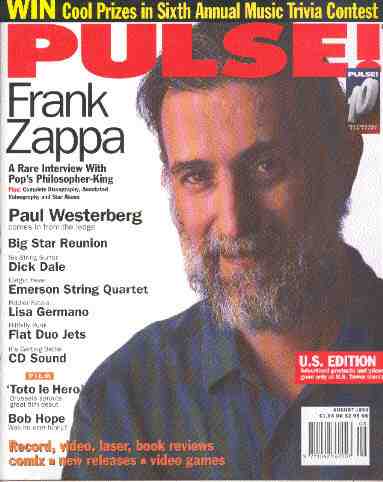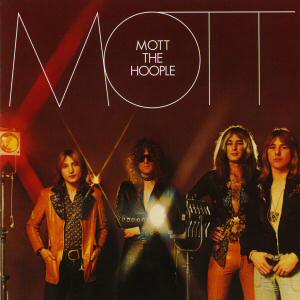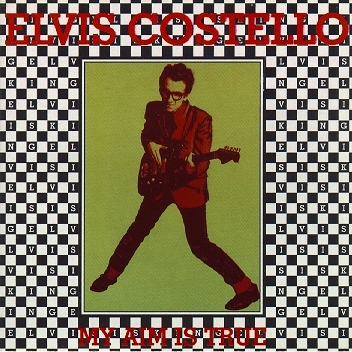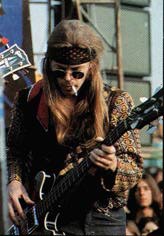
What you are about to read was originally published by a small community newspaper called the West Seattle Herald on Wednesday Feburary 13, 1980.
Every writer has to start somewhere, and this is where I first started applying my craft in a "professional" capacity for the rich sum of twenty bucks a column. This was sometime after I had written a column called "Rock Talk" for my high school newspaper, and several years before I would write professionally for magazines like The Rocket and Tower Records Pulse Magazine, before eventually landing right here at Blogcritics. The Herald was basically my first professional writing gig.
 At the time I was kind of "the rock guy" here in West Seattle. I worked at the neighborhood record store Penny Lane, and I wrote about rock and roll for the local paper. So they would run my little column each and every week on Wednesday when the paper was published, complete with a little picture of me up in the corner. They alternated the pictures often. My least favorite was the one where I was sporting this ridiculous Afro. My favorite was the one where I have that classic seventies rock look with the long hair and the mustache. I kind of look like the guy who plays the lead singer of the band in Almost Famous in that one.
At the time I was kind of "the rock guy" here in West Seattle. I worked at the neighborhood record store Penny Lane, and I wrote about rock and roll for the local paper. So they would run my little column each and every week on Wednesday when the paper was published, complete with a little picture of me up in the corner. They alternated the pictures often. My least favorite was the one where I was sporting this ridiculous Afro. My favorite was the one where I have that classic seventies rock look with the long hair and the mustache. I kind of look like the guy who plays the lead singer of the band in Almost Famous in that one. 
Anyway, since I often revisit my past in this column, I thought it would be kind of fun to run one of my old Herald articles here. In the interest of authenticity, I've even left most of the mistakes and grammatical errors in there (and there are more than a few of them). But I did correct a few such as the really bad misspelling of the band Supertramp's name.
So this is how I looked back on my favorite albums of the seventies at the time. For the most part, I think I mostly got it right too. Though I'd probably take back what I said about Supertramp back then if I were writing this today. I still like that album, but comparing it to Pink Floyd's Dark Side Of The Moon is probably a bit of a stretch.
So to say I was raw as a writer back then would be an understatement. I didn't even have a typewriter so I used to turn my articles in handwritten if you can believe that.
But my editor at the Herald--a really sweet lady named Jeanne Sweeney who I once took to a Jesse Colin Young concert so she could write about experiencing a rock concert from the dreaded "adult perspective"--took quite a shine to me so I still got away with it. Fortunately for me, I had really nice penmanship.
So I'd like to think that I've long since refined some of the obvious rough edges in my writing back then--which will soon become evident as you read this. But you certainly can't fault my youthful enthusiasm. Anyway, here is that original article:
Trying to narrow down ten years of rock into it's ten or twenty best albums is of course a ridiculous proposition.
The biggest problem in compiling this list was the recurring names of some artists who seemed to consistently release the decade's best work.
Therefore this list has been narrowed down to fifteen artists, some with several albums under each respective heading. The choices are based on several things. These are the artists I felt best represented the different phases of the decade. The artists whose significance I felt will be measured most in the years to come. And the artists whose records were on my turntable most in the seventies.
1. Bruce Springsteen
Born To Run (1975)
Born To Run (1975)
Darkness On The Edge Of Town (1978)
The last of rock and roll's great innocents, Springsteen is an artist whose importance is only begining to be measured. Born To Run and Darkness On The Edge Of Town together are the soundtrack of urban and rural teenage America.
Quadrophenia (1973)
By Numbers (1975)
Pete Townshend represents the very soul of rock music. Quadrophenia is the masterpiece which tied all of the elements of the Who together into a moving statement on youth and it's loneliness. By Numbers was a revealing personal re-evaluation of the Who's future goals.
Diamond Dogs (1974)
Young Americans (1975)
Bowie was the most enigmatic personality of the decade. Ziggy is the rock classic of the glitter era. Diamond Dogs was Bowie at his over-dramatic, apocalyptic best. Young Americans, Bowie's experiment with soul, created his most believable persona.
Dark Side Of The Moon (1973)
Animals (1977)
Dark Side is as cohesive a work as was produced this decade. It's brilliant production brings it as close to the "Sgt. Pepper of the seventies" tag as anything. Animals is an amazing statement on the human condition and it's trappings.
5. Rolling Stones
Exile On Main Street (1972)
Some Girls (1978)
1972 found the Stones at the height of it's creative
talents, with a brilliant album in Exile and it's best live performances as a band. Just as some had written them off, 1978's Some Girls found the band hitting yet another peak.
Blood On The Tracks (1974)
Slow Train Coming (1979)
The seventies were a period of several comebacks for Dylan. Blood On The Tracks was arguably the most powerful record of his career, with "Idiot Wind" as biting as any of his lyrical work. Slow Train was Dylan's most courageous outing since the sixties, a testimony to his newfound faith.
On The Beach (1974)
Rust Never Sleeps (1979)
Neil Young laid his soul on the line record after record. On The Beach showed a loneliness and desperation in sharp contrast to the hope and optimism of Rust Never Sleeps
Physical Graffiti (1975)
Heavy Metal was as dominant as anything in the seventies and Led Zep carried the torch for a decade. With Graffiti, Zep hit it's final peak before a slow period of deterioration. "Ten Years Gone" and "Kashmir" are among Zep's finest moments.
9. Alice Cooper
Schools Out (1972)

"School's Out" was to 1972 what "My Generation"
was to 1965. Cooper's final triumph before an embarrasing descent into self parody, "School's Out" was the seventies anthem of teenage rebellion by an artist who seemed rebellious at the time.
Mott (1973)
All American Alien Boy (1976)
Ian Hunter and Mott The Hoople never gained the recognition they deserved, and Hunter's lyrics always reflected this. Where Mott hid behind a pretense of stardom's trappings, All American Alien Boy bitterly laid the truth of the matter on the line.
11. Genesis
Selling England By The Pound (1974)
The Lamb Lies Down On Broadway (1975)
Truly the most innovative and original of the art-progressive rock genre. Peter Gabriel's dramatic, if idiosyncratic vocals and persona were a perfect compliment to the rich texture and perfectly executed musicianship of Genesis.
12. Ramones
Leave Home (1977)
Rocket To Russia (1978)
The Buddahs Ramome (Glen's note--it was supposed to read "Bruddahs") came along at a perfect time, and influenced a generation of rockers who would top the charts two years later (Glen's other note--make that more like fifteen years later). Slashing guitars, dexedrine speed and irresistable Beach Boys harmonies marked these misunderstood innovators.
Crime Of The Century (1976)
Crime is an audio orgy which hits the listener on every level. It is a densely textured and produced masterpiece matched only by Pink Floyd's Dark Side Of The Moon this decade. Unfortunately, Supertramp have never matched the wall of sound "eargasm" of this record.
14. Elvis Costello
My Aim Is True (1977)
This Years Model (1978)
Armed Forces (1979)
Costello is undeniably the artist to watch in the eighties. His cynical, bitter lyricism combined with a seemingly unending arsenal of great pop tunes made him the most dynamic force of the late seventies. One wonders if he will burn out.
Never Mind The Bollocks (1977)
Although preceded three years by the New York Dolls, the Pistols brief cultural shock hit a stagnant rock scene in the face. The impact of this band is best measured by looking at rock's current direction. Short, non-excessive economical rock. This is why the Stones released Some Girls.





























